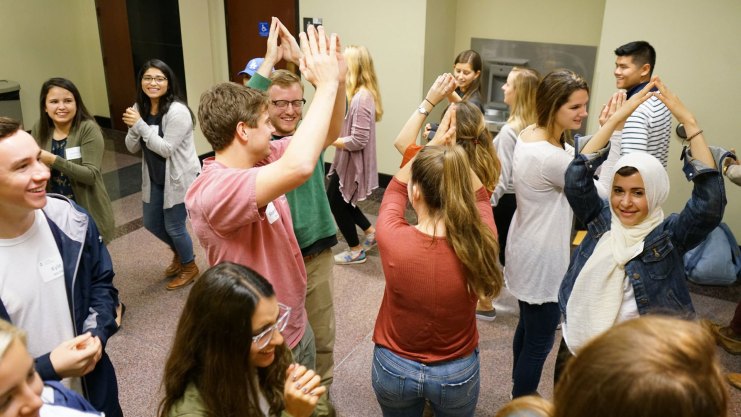News & Stories
The Business of Next: Carolina celebrates 100 years of undergraduate business education

If you had a dollar in 1919, you could buy a nice dress shirt, two dozen eggs or five cups of coffee. Vacuum cleaners had just become commercially available, and the World Wide Web was 70 years away from its inception.
The century ahead would bring tremendous change in the world of business and technology, and UNC Kenan-Flagler Business School’s Undergraduate Business Program would be at the leading edge of every turn.
“For a long time, we have had the right DNA for the 21st century,” said Douglas Shackelford, dean of UNC Kenan-Flagler Business School, who himself graduated from the Undergraduate Business Program in 1980. “We have a long legacy of innovation, starting 100 years ago. And today I think the business school is better than ever.”
Originally called the School of Commerce, the program was born in an unlikely time and an unlikely place. The country was recovering from World War I, and North Carolina was struggling to keep pace, sitting on the bottom of the country’s economic rung.
But the program at Carolina — one of the first of its kind in the United States — would quickly begin to play a role in changing that.
“The economic impact our students have on the state, both in the short-term and in the long run, is huge,” Shackelford said. “Carolina is a place of extraordinary public service, and the business school has always been part of that effort to improve people’s lives. Today our students continue to contribute so much to their communities, whether that’s the town, the state, the nation or the world.”
Student demand for the program has only grown over the decades, from 125 enrolled students in 1919 to nearly 900 today. The program has remained relevant for a century by continuously adapting to the ever-changing business world.
As the business world becomes increasingly international, the Undergraduate Business Program went global with it. UNC Kenan-Flagler encourages undergraduates to travel abroad, offering everything from two-week immersion trips to eight-week international internships and semester-long study abroad programs.
For students who can’t go abroad, faculty and staff have found an innovative way to simulate the experience. Last year, virtual reality goggles transported students to Cameroon, launching them into a boardroom in the French-speaking, central African country.

Classroom innovation has been a part of the program’s mission since its founding, although it hasn’t always looked like an episode of The Jetsons. For Shimul Melwani, assistant professor of organizational behavior, innovative teaching can take many forms, from giving students seed money to launch and run a small business over the course of a semester to asking students to role-play through a business challenge they may encounter in the working world.
“We never go through a single class without engaging the students in some kind of experiential exercise that translates to a real-life example. It goes beyond what you might think of as ‘typical’ business school tasks,” she said. “In any kind of job you do, you have to bring creativity, empathy and openness, and a lot of classes are designing projects that enable students to engage in these kinds of ways.”
Those skills are essential, Melwani said, because Carolina students are driven not only to achieve professional success, but also to become better human beings — to take the hands-on experience they gain as undergraduates and to apply it to the world in ways that make a difference.
“I’m surrounded by a group of peers who constantly impress me, and when I see my friends doing and enjoying meaningful work, I’m driven to do more myself,” said Jack Amoroso, a senior studying both business and entrepreneurship. “During my undergraduate career, I learned how to be uncomfortable, and working through uncomfortable situations gave me the confidence to focus on the work that really mattered once I was on my own.”
Shackelford’s vision, he said, is to find new ways to accommodate more of the bright students who are seeking a Carolina business education, holding fast to the program’s enduring spirit of innovation, humility and social responsibility.
“We are stewards of an institution that has already changed the lives of thousands of people, directly and indirectly, over these many years,” Shackelford said. “Now, we want to deepen and broaden our impact on people’s lives and our society.”